The Progressive Conservative Association of Alberta was a provincial centre-right party in the Canadian province of Alberta that existed from 1905 to 2020. The party formed the provincial government, without interruption, from 1971 until the party's defeat in the 2015 provincial election under premiers Peter Lougheed, Don Getty, Ralph Klein, Ed Stelmach, Alison Redford, Dave Hancock and Jim Prentice. At 44 years, this was the longest unbroken run in government at the provincial or federal level in Canadian history.

The Alberta New Democratic Party, is social democratic political party in Alberta, Canada. The party sits on the centre-left of the political spectrum and is a provincial Alberta affiliate of the federal New Democratic Party.
The British Columbia Social Credit Party was a conservative political party in the province of British Columbia, Canada. The provincial Social Credit movement was divided in its early years and was largely under the influence of the Alberta Social Credit League; it did not have a functional leadership before 1952.
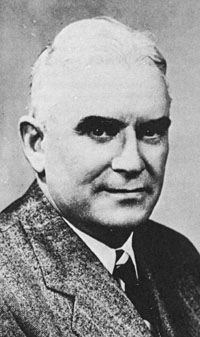
The 1952 British Columbia general election was the 23rd general election in the Canadian province of British Columbia. It was held to elect members of the Legislative Assembly of British Columbia, alongside a plebiscite on daylight saving time and liquor. The election was called on April 10, 1952, and held on June 12, 1952. The new legislature met for the first time on February 3, 1953.
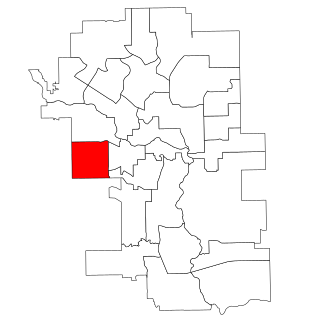
Calgary-West is a provincial electoral district for the Legislative Assembly of Alberta, Canada.

Calgary Montrose was a provincial electoral district in Calgary, Alberta, Canada, mandated to return a single member to the Legislative Assembly of Alberta using the first past the post method of voting from 1986 to 2012.
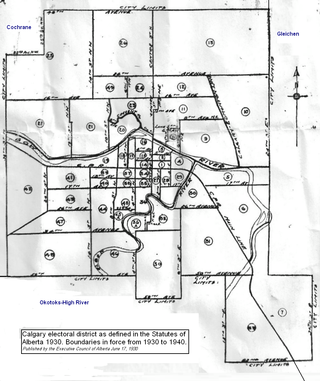
Calgary was a provincial electoral district in Alberta, Canada, mandated to return one to six members to the Legislative Assembly of Alberta from 1905 to 1913, and again from 1921 to 1959. The district largely encompassed the boundaries of the City of Calgary, and was revised accordingly as the city grew.
The 2006 Alberta Progressive Conservative leadership election was held in November and December 2006 to choose a new leader for the Progressive Conservative Association of Alberta to replace the retiring Ralph Klein. Ed Stelmach emerged as the winner of an eight candidate field, despite placing third on the first ballot.
The Wildrose Party was a conservative provincial political party in Alberta, Canada. The party was formed by the merger in early 2008 of the Alberta Alliance Party and the unregistered Wildrose Party of Alberta. The wild rose is Alberta's provincial flower.
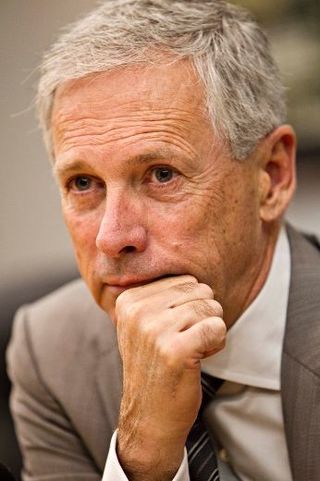
The Honorable Richard D. "Rick" Orman is a businessman and former Canadian politician. Orman was born in Calgary, Alberta fourth generation Albertan. He studied at the University of Calgary before graduating with honors from Eastern Washington University in 1971. Orman served as a member of the Legislative Assembly of Alberta from 1986 to 1993. Since 1993, he has been active within the business community, both provincially and internationally.
Ernest Shilston Watkins was a provincial politician and author from Alberta, Canada. He served as a member of the Legislative Assembly of Alberta from 1957 to 1963.

Richard William McIver is a Canadian politician who has represented Calgary-Hays in the Legislative Assembly of Alberta since 2012. A member of the United Conservative Party (UCP), McIver is the current minister of municipal affairs.
This page lists the results of leadership elections held by the Alberta Liberal Party. Delegated conventions were held until 1988. Elections held since 1994 have been on a One member, one vote basis.

Calgary-Glenmore, styled Calgary Glenmore from 1957 to 1971, is a provincial electoral district in Calgary, Alberta, Canada. The district is mandated to return a single member to the Legislative Assembly of Alberta.
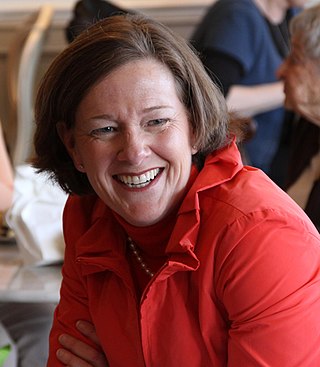
The Progressive Conservative Association of Alberta leadership election, 2011 was prompted by Ed Stelmach's announcement that he would not be seeking re-election in the 28th general election and therefore would be resigning as leader of the Progressive Conservatives. With the Progressive Conservatives forming the Alberta government, the winner of the election consequently became Premier of Alberta.

The 2015 Alberta general election was held on May 5, following a request of Premier Jim Prentice to the Lieutenant Governor of Alberta Donald Ethell to dissolve the Legislative Assembly on April 7. This election elected members to the 29th Alberta Legislature. It was only the fourth time in provincial history that saw a change of governing party, and was the last provincial election for both the Alberta Progressive Conservative and Wildrose parties, which merged in 2017 to form the United Conservative Party.

The 2014 Progressive Conservative Association of Alberta leadership election was prompted by Alison Redford's announcement that she would be resigning as leader of the Progressive Conservatives and Premier of Alberta on March 23, 2014.
The 2017 Progressive Conservative Association of Alberta leadership election was held on March 18, 2017, in Calgary. It chose Jason Kenney as the successor to former Alberta Premier and Progressive Conservative Association of Alberta leader Jim Prentice. He resigned after the party was defeated in the May 5, 2015 general election. The party had governed the province for 44 consecutive years. Prentice had been elected leader eight months prior to his defeat.

The 2019 Alberta general election was held on April 16, 2019, to elect 87 members to the 30th Alberta Legislature. In its first general election contest, the Jason Kenney-led United Conservative Party (UCP) won 54.88% of the popular vote and 63 seats, defeating incumbent Premier Rachel Notley. The governing Alberta New Democratic Party (NDP) were reduced to 24 seats and formed the Official Opposition. The United Conservative Party was formed in 2017 from a merger of the Progressive Conservative Party and the Wildrose Party after the NDP's victory in the 2015 election ended nearly 44 years of Progressive Conservative rule.

The United Conservative Party of Alberta (UCP) is a conservative political party in the province of Alberta, Canada. It was established in July 2017 as a merger between the Progressive Conservative Association of Alberta and the Wildrose Party. When established, the UCP immediately formed the Official Opposition in the Legislative Assembly of Alberta. The UCP won a majority mandate in the 2019 Alberta general election to form the government of Alberta. The party won a renewed majority mandate in the 2023 Alberta general election under the leadership of Danielle Smith.














